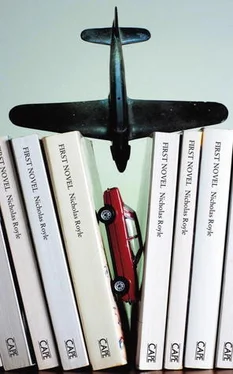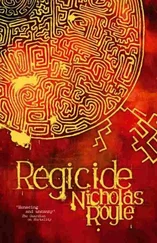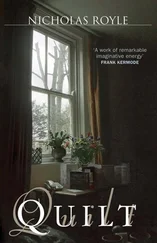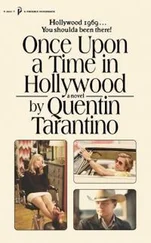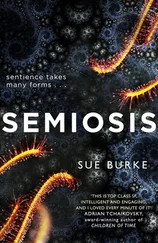Life for Nicholas and Liz turned a dark corner when Liz fell pregnant and while they were both happy about this, and started looking for a flat for just the two of them, the pregnancy did not proceed in a normal manner. After six weeks Liz developed an infection and had to be rushed into the Whittington Hospital. Not only did she lose the baby, but the infection left her sterile without hope of ever conceiving again. Before the pregnancy, babies had been a subject they had raised only rarely, but they had both known it was something they very much wanted for the future, once Liz was qualified and Nicholas was earning, too.
Dark times. Ray, feeling well and keen to do something to cheer up his son and his partner, threw a party in their honour at his flat in Camden. He invited his friends and theirs. Nicholas recognised one or two faces from Broderip Ward. His father introduced him to Oscar Moore, whose novel A Matter of Life and Sex , he had just read, in floods of tears for the most part, and to David — just ‘David’, no surname — an architect in his late sixties. Watching his father with David — the ease and familiarity with which they negotiated each other’s company and anticipated each other’s needs — Nicholas wondered if they were long-term partners.
Nicholas got a job at Time Out and he and Liz did move out of the flatshare into a rented flat of their own, so to speak, in Finsbury Park. Over bowls of black pepper soup at the Jai Krishna on Stroud Green Road, Nicholas asked Liz to marry him and she said nothing would make her happier. When they met up with Ray for dinner in Islington and told him the news, Nicholas asked Ray to be his best man and Ray burst into tears. He said it would be the proudest day of his life. He then joked that they’d better not hang about, though. Nicholas found those jokes, to which Ray had become partial, rather difficult to take, but he assured his father that they were not planning a lengthy engagement.
They married at Marylebone Town Hall on Euston Road and took over one of the cheap Indian restaurants on Drummond Street for the reception. Nicholas’ grandparents came down from Hyde, their first visit to the capital for longer than anyone could remember, including them. In a bid to keep costs down, Nicholas and Liz had not engaged a professional photographer, but had asked a friend of theirs, Simon, to do the honours. Nicholas asked Simon to make sure he got a shot of the family group on the Town Hall steps: Ray and his parents with the bride and groom. Liz’s parents had emigrated to Australia and separated. She had lost touch with her father and the wedding was arranged too quickly for Liz’s mother to be able to come. Nicholas remarked that he had never seen his father in a collar and tie before; wiping sweat from his forehead with a handkerchief, Ray agreed that it was the first time since he’d appeared in court that he had worn such attire. Ray gave a short speech that contained a couple of jokes and a handful of personal remarks that had many guests in tears for different reasons. As the evening wore on, Ray unbuttoned his collar and removed his tie. As he leaned across the table towards Nicholas to say something, a rust-coloured sore or scab could be seen on the side of his neck. Nicholas tried to ignore it and Ray pretended he didn’t know that Nicholas had seen it.
Late in the evening, Simon the photographer entered the Gents to find Nicholas and his father in an embrace. Ray was clasping his son’s head against his chest while Nicholas’ shoulders rose and fell as sobs tore through his body.
Two weeks after the wedding, Ray was back on Broderip Ward. He told Nicholas he thought it could be a long stay this time. Nicholas gathered up an armful of unwanted review copies from the box under the books editor’s desk at Time Out and walked over to the Middlesex.
He waved to a couple of faces on entering the ward. His father was occupying the same bed as he had the first time Nicholas had visited him. He smiled as Nicholas started unloading the books. A bound proof from Faber, This Is the Life by Joseph O’Neill; a collection of stories by Mark Richard, The Ice at the Bottom of the World ; Adam Lively’s The Snail . A handful of crime novels — a new blah blah mystery, an Inspector So-and-so novel — and one or two unknown quantities, first novels from new names put out by small presses, the sort of thing published more in hope than expectation and chucked straight in the charity boxes at books editors’ desks across London.
‘I’m sorry there’s no poetry,’ Nicholas said. ‘The poetry editor takes it all. There’s the odd thing left, but believe me, I’m doing you a favour by not bringing it.’
‘About that,’ Ray said, ‘I want you to do something for me. Look in that drawer. There’s a key.’
Nicholas took a set of keys from the drawer by his father’s bed.
‘Keys to the flat,’ Ray said. ‘I wanted to get that collection sorted and delivered before I came back in here and I ran out of time.’
‘You’ll be out again soon and can do it yourself.’
Ray tried to smile. ‘I don’t want to waste any more time,’ he said. ‘I want it tidied up and delivered. You’ll find it all on the machine in a folder marked “Sniper”. All you need to do is make sure I haven’t forgotten anything obvious, then print it out and post it. You’ll find the address there, too, somewhere. Same lot, anyway. They’ve not moved.’
‘I’ll take care of it for the time being,’ Nicholas said.
Ray was sweating a lot and tended to use the books Nicholas had given him to fan himself with rather than for reading. There was a rash of tiny pustules across his chest and more telltale Kaposi’s sarcomas had appeared on his neck and at the top of his back. His bones were sticking out of his pyjama jacket, creating hollows where perspiration collected. He kept telling Nicholas to go back to work, that there was nothing to see here, move on, show’s over. He managed to stretch a smile across his increasingly skull-like features. Nicholas did leave, but not to go to work. He hired a car and drove to the outskirts of Manchester and then around the M63 to Hyde and he knocked on the door of his grandparents’ house. One visit to London in twenty-five years and now they were expected to go again for the second time in two weeks? Nicholas knew it wasn’t the upheaval of leaving home or the effort required for travel that was putting them off. They had never accepted their son’s sexuality. To them he was still the young Post Office worker who had married the bingo caller, for good or bad; or the young airman on the other side of the equator but still the right side of the sexuality divide; if not the innocent young boy they had brought up to embody the right values and follow the rules of normal behaviour.
‘You may not have another chance to see him,’ Nicholas advised them.
He went out for a walk to give them a chance to talk and when he came back his nana took him into the morning room, which had lost the paraphernalia of childhood but kept the brighter colours.
‘I can’t see your grandad going,’ she said.
Nicholas decided to see this as encouraging and he called Liz to let her know he was stopping the night and would be back the following day. In the morning, he rose early, made a coffee and sat in the back garden listening to a blackbird singing. He wondered if his father had ever done the same. Tea instead of coffee, perhaps. When he went back into the house, his nana was putting her coat on and collecting her handbag from the telephone table in the hall.
‘What about Grandad?’ Nicholas said.
‘I don’t think so,’ said Nana.
Nicholas paused, thinking hard, wondering what more he could do. His grandparents were proud people.
Читать дальше
